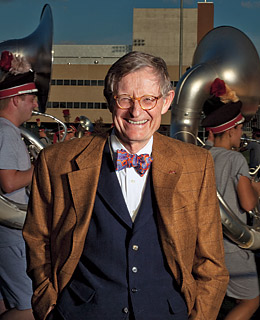
Gordon Gee's school is known for football and a band that marches in cursive, but universities today must be engines of regional economies, he says. Not all college presidents agree.
Even in Ohio, where the Taft name rings a loud bell, it takes a rare talent to hold an audience rapt while telling a long anecdote about William Howard Taft, a President known mainly for his girth. But E. Gordon Gee can do it. Gee (pronounced with a hard G, like a cowboy's gee-tar) is telling his Taft story to a group of solid, sunburned citizens at an inn in Ohio tractor country, and a less likely looking fellow would be hard to conjure in this place. He is dressed, as usual, in a fresh-pressed suit, argyle socks, horn-rimmed glasses and a bright bow tie. Half Orville Redenbacher, half Harold Hill, the fast-talking Gee, a lawyer by training, fits into rural Knox County about as well as the Geico gecko would blend into American Gothic. And yet, as he finally approaches the thoroughly forgettable punch line, Gee and his audience are laughing together as the piles of French toast and sausages go cold on the tables. Gee doesn't mind. He prefers nutritious smoothies at his mansion back in the city.
In other words, this is a thoroughbred politician. Gee shakes hands with gusto and appears delighted by everyone he meets. Peering around the room, he cries out gleefully, "Where are our county commissioners?" A couple of hands go up, and he exults, "I love you guys!" What about state legislators? There's one in the corner. "I love you too!" giggles Gee. Everyone wants a word and a picture with him, and when the time comes to depart, he somehow radiates reluctance even as he quicksteps toward a waiting car. Goodbye, goodbye! How dearly he would love to tarry with his new friends, but the good people of Tuscarawas County are waiting, and after them the yeomen of Holmes and Muskingum. There are 88 counties in Ohio, and Gee is in the process of barnstorming through every one of them. Again.
A poll a while back found that he could easily be elected governor in a state that calls itself the Cradle of Presidents. Gee, however, has something different in mind. As president of the Ohio State University and one of the most experienced university executives in the U.S., he is campaigning for a revolution in higher education at a time when the field is more important, and perhaps more troubled, than ever before.
In a world where brainpower outstrips muscle power, where innovation trumps conformity, where the nimble and creative stand to inherit the earth, higher education is the key to the next American century. Forget the ivory tower: colleges and universities are catalysts of economic development, stewards of public health, incubators of social policy and laboratories of discovery. Nearly every great national challenge — from the raising of our children to the quality of our food supply, from the hunt for clean energy to the struggle against insurgent enemies, from the quest for opportunity to the search for sustainable prosperity — depends for a solution on institutions of higher ed. Classrooms and labs are today what mines and factories were a century ago: America's regional economic powerhouses, one of the few certain engines of growth in good and bad economic times. As a result of these challenges and opportunities, college presidents are on the line as never before — and must be accessible and accountable to the public in a way that rivals or even surpasses what is required of public officials.
Gee's permanent campaign mode is an acknowledgment of the power and responsibility of today's higher-ed leaders. He doesn't shy from tasks on par with those of Ohio's big-city mayors, members of Congress, even the governor. "Being president of a major public university is the most political nonpolitical office around," he says. "We're campaigning on behalf of our mission." Gee's power is evident in his $4.35 billion budget — bigger, he notes, than the budget of the state of Delaware — and the outsize role his institution plays in the state's economy. Gee presides over some 40,000 employees, one of the state's largest and best hospitals, a major hive of research, a small-business incubator, a hugely popular sports-entertainment empire, a large portfolio of real estate (including a small city's worth of housing units) and a network of extension operations reaching into nearly every community in the state. In bad times, the university is a significant economic bright spot.
By some measures, "Ohio State is the largest research-university campus in the country — we think in the world," says Leslie Wexner, the billionaire retailer who chairs the university's board of trustees. "It is a very big, very powerful organization. Gordon understands the potential influence his job entails. Most university presidents are focused on internal issues — the tug-of-war among faculty, students and alums — and they don't have the bandwidth to see how extensive their influence should be."